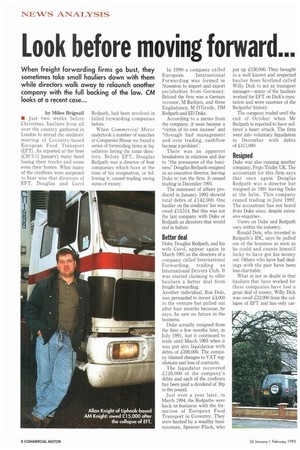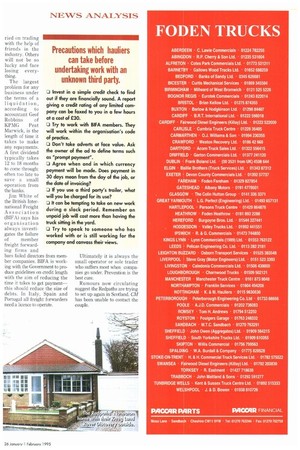Look before moving forward...
Page 12

Page 13

If you've noticed an error in this article please click here to report it so we can fix it.
When freight forwarding firms go bust, they sometimes take small hauliers down with them while directors walk away to relaunch another company with the full backing of the law. CM looks at a recent case...
by Miles Brignall • Just two weeks before Christmas, hauliers from all over the country gathered in London to attend the creditors' meeting of Coventry-based European Food Transport (EFT). As reported at the time (CM 5-11 January), many faced losing their trucks and some even their homes. What many of the creditors were surprised to hear was that directors of EFT. Douglas and Carol Redpath, had been involved in failed forwarding companies before.
When Commercial Motor undertook a number of searches at Companies House we found a series of forwarding firms in liquidation listing the same directors. Before EFT, Douglas Redpath was a director of four companies which have at the time of his resignation, or following it, ceased trading owing sums of money. In 1990 a company called European International Forwarding was formed in Nuneaton to import and export perishables from Germany. Behind the firm was a German investor, M Rathjen, and three Englishmen, M O'Grady, DM Redpath and ED Duke.
According to a memo from the company, it soon became a "victim of its own success" and "through bad management and over trading, cashflow became a problem".
There was an apparent breakdown in relations and due to "the pressures of the business" Douglas Redpath resigned as an executive director, leaving Duke to run the firm. It ceased trading in December 1991.
The statement of affairs produced in January 1992 showed total debts of £142,000. One haulier on the creditors' list was owed £13,514. But this was not the last company with Duke or Redpath as directors that would end in failure.
Better deal
Duke, Douglas Redpath, and his wife Carol, appear again in March 1991 as the directors of a company called International Forwarding, trading as International Drivers Club. It was started claiming to offer hauliers a better deal from freight forwarding, Another individual, Ron Dole, was persuaded to invest £4,000 in the venture but pulled out after four months because, he says, he saw no future in the business.
Duke actually resigned from the firm a few months later, in July 1991, but it continued to trade until March 1993 when it was put into liquidation with debts of £200,000. The company blamed changes to VAT regulations and loss of contracts.
The liquidator recovered £120,000 of the company's debts and each of the creditors has been paid a dividend of 30p in the pound.
Just over a year later, in March 1994, the Redpaths were back in business with the formation of European Food Transport in Coventry. They were backed by a wealthy businessman, Spencer Flack, who put up 4130,000. They brought in a well known and respected haulier from Scotland called Willy Dick to act as transport manager—many of the hauliers worked for EFT on Dick's reputation and were unaware of the Redpaths' history.
The company traded until the end of October when Mr Redpath is reported to have suffered a heart attack. The firm went into voluntary liquidation in December with debts of £411,000.
Resigned
Duke was also running another company, Frigo Trailer UK. The accountant for this firm says that once again Douglas Redpath was a director but resigned in 1991 leaving Duke at the helm. This company ceased trading in June 1992. The accountant has not heard from Duke since, despite extensive enquiries.
Views on Duke and Redpath vary within the industry.
Ronald Dole, who invested in Redpath's IDC, says he pulled Out of the business as soon as he could and counts himself lucky to have got his money out. Others who have had dealings with the pair have been less charitable.
What is not in doubt is that hauliers that have worked for these companies have lost a great deal of money. Willy Dick was owed £32,000 from the collapse of EFT and has only car ried on trading with the help of friends in the industry. Others will not be so lucky and face losing everything.
The largest problem for any business under the terms of a according to accountant Genf Robbins of KPNIG Peat Marwick, is the length of time it takes to make any repayments. A first dividend typically takes 12 to 18 months to come through: often too late to save a small operation from the banks.
Jim White of the British International Freight Association (BIFA) says his organisation always investigates the failure of member freight forwarding firms and bars failed directors from member companies. BIFA is working with the Goveniment to produce guidelines on credit length with the aim of reducing the time it takes to get payment this should reduce the size of debts. In Italy, Spain and Portugal all freight forwarders need a licence to operate. Ultimately it is always the small operator or sole trader who suffers most when companies go under. Prevention is the best cure.
Rumours now circulating suggest the Redpaths are trying to set up again in Scotland. CM has been unable to contact the couple,




























































































